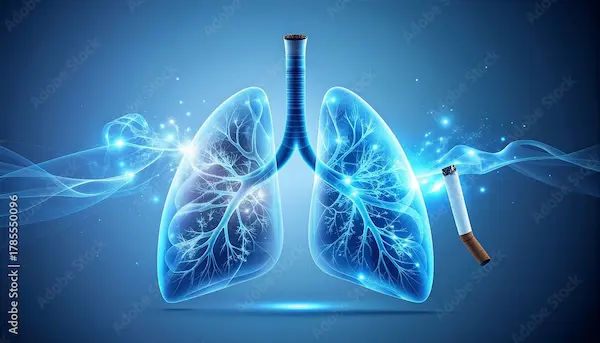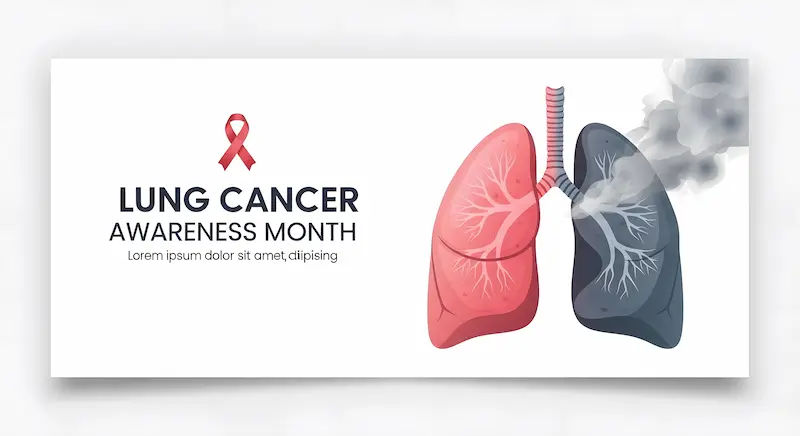Guide to Lung Cancer 4 Warning Signs In The Morning
Discover the 4 key morning warning signs of lung cancer, how to recognise them early, and when to seek medical help for timely diagnosis.

Written by Dr. Dhankecha Mayank Dineshbhai
Reviewed by Dr. Rohinipriyanka Pondugula MBBS
Last updated on 25th Sep, 2025

Introduction
Waking up feeling refreshed is the goal, but for some, mornings are marked by unsettling symptoms that are easy to dismiss as a "bad night's sleep" or a "lingering cold." However, certain recurring morning issues can be your body's early warning system. While many factors can cause morning discomfort, understanding the specific signs linked to lung cancer is crucial for early detection. Lung cancer is often diagnosed at later stages because its early symptoms can be subtle and mistaken for common ailments. This guide zeroes in on the four key warning signs of lung cancer that may be particularly noticeable when you first wake up. We'll explore what to look for, how to distinguish these signs from less serious conditions, and the critical next steps to take for your health. Recognising these signals can empower you to seek timely medical advice, potentially making a significant difference in outcomes.
The 4 Key Morning Warning Signs of Lung Cancer
The morning hours can amplify certain lung cancer symptoms. After a night of lying down, fluid or phlegm may accumulate, and tumours can cause increased irritation upon your first movements of the day. Here are the four signs that warrant attention.
1. A Persistent Morning Cough That Won't Quit
A cough is a common reflex, but a cough linked to lung cancer has distinct characteristics. It's not the cough that disappears after a week with a cold; it's a persistent morning cough that lingers for weeks or even months and may change in character over time.
What Makes a Cough "Suspicious"?
- Duration: A cough that lasts for more than 8 weeks is considered chronic and requires medical evaluation.
- Change in Pattern: If your typical "smoker's cough" becomes deeper, hoarser, or more frequent.
- Productiveness: You may cough up more phlegm (sputum) than usual, which can be clear, white, yellow-green, or even rust-coloured.
- Pain: Coughing may be accompanied by chest, back, or shoulder pain.
This persistent irritation is often caused by a tumour pressing on the airways. If a new cough doesn't go away or an existing cough worsens significantly, it's a primary signal to consult a doctor.
2. Morning Shortness of Breath (Dyspnoea)
Feeling unusually winded after simple morning activities, like making your bed or walking to the kitchen, can be a sign of shortness of breath in the morning, medically known as dyspnoea. This occurs when a lung tumour blocks or narrows an airway, or if fluid builds up around the lungs (a condition called pleural effusion), preventing them from expanding fully.
Is It Just Being Out of Shape or Something More?
While being inactive can lead to breathlessness, key differentiators for a more serious cause include:
- Progressiveness: The breathlessness gets worse over time, not better with light activity.
- Occurrence at Rest: You feel short of breath even when sitting or lying down.
- Association with Other Symptoms: It occurs alongside a persistent cough, wheezing, or chest pain.
If you find yourself gasping for air during routine morning tasks that never used to faze you, it's a symptom that should not be ignored.
Consult an Oncologist for the best advice
3. Coughing Up Blood or Rust-Coloured Phlegm (Haemoptysis)
This is one of the most alarming symptoms and should never be overlooked. Coughing up blood, even small streaks of bright red blood in your phlegm, is a condition called haemoptysis. The blood may also appear as rust-coloured sputum. This sign indicates that a tumour in the airway is bleeding or that inflammation and damage are occurring in the lung tissue.
While other conditions like bronchitis can cause this, the presence of blood in your morning phlegm necessitates immediate medical investigation to rule out lung cancer or other serious illnesses.
4. Unexplained Morning Hoarseness or Voice Changes
If you consistently wake up with a raspy, strained, or weaker voice that doesn't clear up after you've been awake and hydrated for a while, it could be a warning sign. This hoarseness occurs when a lung tumour affects the nerve that controls the larynx (voice box). This nerve, called the recurrent laryngeal nerve, runs close to the lungs. Pressure from a tumour can paralyse or irritate it, leading to voice changes.
Unlike hoarseness from a cold or overuse, this type persists for more than two weeks without an obvious reason. If your voice hasn't returned to normal after this time, consult a doctor online with Apollo24|7 for an initial evaluation.
Beyond the Morning: Other Associated Symptoms to Watch For
While this guide focuses on morning signs, lung cancer is a systemic disease and can cause a range of other symptoms. Be aware of:
- Unexplained Weight Loss: Losing weight without trying is a common cancer-related symptom.
Loss of Appetite - Persistent Fatigue: A deep, unshakable tiredness that isn't relieved by rest.
- Recurrent Infections: Frequent bouts of bronchitis or pneumonia can occur if a tumour is blocking part of a lung, trapping bacteria.
- Wheezing: A whistling sound when you breathe.
Chest Pain that worsens with deep breathing, coughing, or laughing.
What to Do If You Experience These Morning Symptoms
Taking proactive steps can alleviate anxiety and lead to a faster diagnosis.
Step 1: Monitor and Document Your Symptoms
Keep a simple log for a week or two. Note:
- Frequency: How many mornings a week does the symptom occur?
- Severity: Rate the cough or shortness of breath on a scale of 1-10.
- Description: What does the phlegm look like? How does your voice sound?
- This information will be invaluable for your doctor.
Step 2: Consult a Healthcare Professional
Do not wait. Schedule an appointment with your primary care physician or a pulmonologist (a lung specialist). Based on your symptoms and risk factors (like smoking history), they may recommend tests such as a chest X-ray or a low-dose CT scan, which is a highly effective screening tool for those at high risk. If your condition does not improve after monitoring, book a physical visit to a doctor with Apollo24|7 for a thorough examination.
Conclusion: Empowerment Through Awareness
Mornings should be a time of renewal, not distress. While the symptoms discussed here can be caused by conditions other than lung cancer, such as asthma, COPD, or chronic infections, their persistence is your body's way of signalling that something is wrong. Ignoring a persistent morning cough or unexplained breathlessness can have serious consequences. This guide aims not to incite fear, but to empower you with knowledge. By understanding these 4 warning signs of lung cancer, you are equipped to listen to your body and take proactive, informed action for your health. Your well-being is paramount—if you recognise these signs, make the call to a healthcare professional today. It's always better to be cautious and get a clean bill of health than to delay a potentially life-saving diagnosis.
Consult an Oncologist for the best advice
Consult an Oncologist for the best advice

Dr.sanchayan Mandal
Medical Oncologist
17 Years • MBBS, DrNB( MEDICAL ONCOLOGY), DNB (RADIOTHERAPY),ECMO. PDCR. ASCO
Kolkata
Dr. Sanchayan Mandal Oncology Clinic, Kolkata

Dr. Sanchayan Mandal
Medical Oncologist
17 Years • MBBS, DNB Raditherapy, DrNB Medical Oncology
East Midnapore
VIVEKANANDA SEBA SADAN, East Midnapore

Dr Gowshikk Rajkumar
Oncologist
10 Years • MBBS, DMRT, DNB in Radiation oncology
Bengaluru
Apollo Clinic, JP nagar, Bengaluru

Dr. Raja T
Oncologist
20 Years • MBBS; MD; DM
Chennai
Apollo Hospitals Greams Road, Chennai
(200+ Patients)

Dr. Gopal Kumar
Head, Neck and Thyroid Cancer Surgeon
15 Years • MBBS, MS , FARHNS ( Seoul, South Korea ), FGOLF ( MSKCC, New York )
Delhi
Apollo Hospitals Indraprastha, Delhi
(25+ Patients)
Consult an Oncologist for the best advice

Dr.sanchayan Mandal
Medical Oncologist
17 Years • MBBS, DrNB( MEDICAL ONCOLOGY), DNB (RADIOTHERAPY),ECMO. PDCR. ASCO
Kolkata
Dr. Sanchayan Mandal Oncology Clinic, Kolkata

Dr. Sanchayan Mandal
Medical Oncologist
17 Years • MBBS, DNB Raditherapy, DrNB Medical Oncology
East Midnapore
VIVEKANANDA SEBA SADAN, East Midnapore

Dr Gowshikk Rajkumar
Oncologist
10 Years • MBBS, DMRT, DNB in Radiation oncology
Bengaluru
Apollo Clinic, JP nagar, Bengaluru

Dr. Raja T
Oncologist
20 Years • MBBS; MD; DM
Chennai
Apollo Hospitals Greams Road, Chennai
(200+ Patients)

Dr. Gopal Kumar
Head, Neck and Thyroid Cancer Surgeon
15 Years • MBBS, MS , FARHNS ( Seoul, South Korea ), FGOLF ( MSKCC, New York )
Delhi
Apollo Hospitals Indraprastha, Delhi
(25+ Patients)
More articles from Lung Cancer
Frequently Asked Questions
Can you have lung cancer with no morning cough or symptoms?
Yes, it's possible, especially in the early stages. Some types of lung cancer, like those located on the outer edges of the lungs, may not cause coughing or breathing problems until they are quite large or have spread.
I'm a non-smoker. Should I still be concerned about these morning signs?
Absolutely. While smoking is the leading risk factor, non-smokers can and do develop lung cancer due to factors like secondhand smoke, radon gas exposure, family history, or air pollution. Anyone with persistent respiratory symptoms should see a doctor.
How long should I wait before seeing a doctor about a morning cough?
You should not wait longer than 2-3 weeks for a new, persistent cough that has no obvious cause (like a cold). If you have a history of smoking or other risk factors, it's best to seek advice sooner.
What is the difference between a lung cancer cough and an asthma cough?
An asthma cough is often triggered by allergens, exercise, or cold air and may be accompanied by wheezing. It typically responds to inhalers. A lung cancer cough is more constant, may change over time, and is not linked to specific triggers. A doctor can help differentiate between the two.
Are there any reliable early detection tests for lung cancer?
For individuals at high risk (e.g., long-term smokers aged 50-80), annual screening with a low-dose CT (LDCT) scan has been shown to reduce the risk of dying from lung cancer by detecting it at an earlier, more treatable stage. Discuss your eligibility with your doctor.




